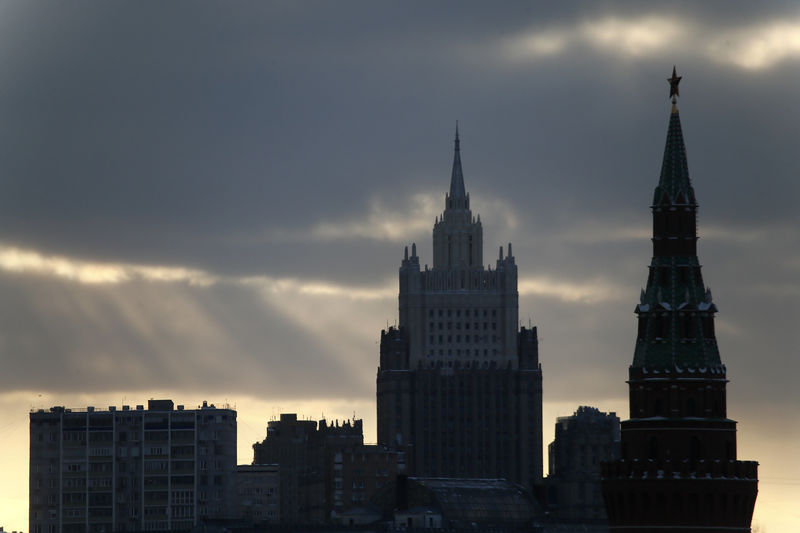By Claire Milhench and Sujata Rao
LONDON (Reuters) - "Who's next?" investors in Russia are asking as they scramble to clear their portfolios of "oligarch risk" - holdings in companies that may be next in line for U.S. sanctions after metals company Rusal (HK:0486) was targeted last week.
The threat of more sanctions had already made investors wary of Russian companies, seen as more vulnerable to U.S. action than the sovereign. Their fears proved justified when on April 6, the U.S. Treasury slapped sanctions on a range of Russian companies and "oligarchs" -- businessmen deemed to be close to the Kremlin.
Aluminium company Rusal (HK:0486), controlled by Oleg Deripaska, has been one of the main targets. Rusal itself has warned that the impact of sanctions could trigger technical default on some of its debts.
Earlier sanctions on major Russian companies were so-called sectoral sanctions which limit U.S. investor participation in debt-raising for sanctioned firms. The sanctions imposed on Rusal this month go further, barring U.S. investors from having any dealings with the sanctioned entities.
Russia's sovereign debt and assets of other Russian companies are not yet sanctioned but that might change. Washington is looking at new sanctions aimed at Russian companies allegedly dealing with equipment related to chemical weapons in Syria.
GRAPHIC: Russian bond exposure https://tmsnrt.rs/2qCWujc
"The question investors have is: who is next? Could you extend Rusal-style sanctions to other companies? Potentially they could," said Greg Saichin, chief investment officer for emerging market debt at Allianz (DE:ALVG) Global Investors.
"We know of a number of individuals who are either owners of companies or have stakes in companies, who may be next in line ... There is oligarch risk so we have moved to reduce the Kremlin element in the portfolio," he added.
A list of 210 wealthy Russians named by the U.S. Treasury in January is widely seen as the place to look for clues. It contained 96 oligarchs, including Vladimir Potanin, co-owner of Norilsk Nickel, metals magnates Alisher Usmanov and Alexei Mordashov and CEOs of two big state-run banks.
John Bates, a portfolio manager at PineBridge Investments, said he had reduced exposure to companies with high "oligarch risk", noting that if sanctions were expanded "we could be in another quite severe leg down in terms of valuations."
The latest U.S. sanctions have caused pain across Russian markets, which were riding high with investors prior to last week's sell off. Investors' Russian bond holdings as of end-March would have been around $46 billion, assuming their allocation to Russia was the same as its share in various global bond indexes, data from State Street Global Advisors (SSGA) shows.
CALCULATED RISKS
Last week, as the rouble (RUB=) dropped 6 percent, equities fell 4.6 percent (IMOEX) and Russian corporate dollar bond yields surged by an average 100 basis points <.JPMCRUS>, those portfolios would have suffered heavy losses.
Ratings agency Fitch said the sell-off reflected fears the sanctions list would be extended, possibly to companies that transact with the already designated entities and individuals.
As a result, investors are not ready yet to pick over the wreckage for bargains.
Even before the meltdown, asset managers had been screening Russian companies to avoid exposure to those already subject to sanctions imposed after Russia's annexation of Ukraine's Crimea region in 2014.
Ironically though, those sanctions made companies' debt more attractive to some investors. A volatile rouble, government pressure to cut external debt and higher barriers to raising debt on international markets steadily reduced their outstanding debt levels.
Russian companies, excluding banks, have about $270 billion in hard currency debt according to TD Securities, and just $13 billion falls due in 2018. Servicing that will not be a problem -- unless they are hit with sanctions too.
Fund managers would have to take a "calculated risk" on which Russian names to sell, Saichin of Allianz said.
"If no sanction has been imposed you basically have to sit on it," he said, noting there were few buyers for the bonds anyway.
Money managers in general see low sanctions risk for Russian sovereign debt and securities of state-run flagship companies such as Gazprom (MM:GAZP), which supplies a major part of Europe's energy, or Sberbank (MM:SBER), Russia's biggest bank.
Others such as Lukoil (MM:LKOH) or Phosagro (MM:PHOR), which have kept themselves at arms' length from the Kremlin, are also considered a safer bet.
Markets reflect that view -- the bonds of steelmaker Severstal (MM:CHMF), around 80 percent owned by Alexei Mordashov, were the biggest fallers last week from a list of mining and energy firms, after Rusal and Polyus Gold (MM:PLZL), Abhishek Kumar, lead investment manager for emerging markets fixed income beta at SSGA, noted.
Polyus is controlled by the family of Suleiman Kerimov who is on the sanctioned individuals list.
Bonds in Evraz (L:EVRE), Norilsk Nickel (MM:GMKN), Metalloinvest and steel pipe maker TMK (MM:TRMK) also fell an average 3-5 cents last week, while Lukoil and state firm Rosneftegaz fell the least.
"Clearly, the sentiments are against any companies dealing in commodities," Kumar said.
Steelmaker NLMK (MM:NLMK) is controlled by Vladimir Lisin while TMK is majority-owned by Dmitry Pumpyansky. Neither man is on the list of sanctioned individuals.
As for Russia's sovereign debt, most investors are sitting tight, believing Washington will not bar investors from it, even if the U.S. Congress is trying to build support for such a step.
Salman Ahmed, chief investment strategist at Lombard Odier Investment Managers said the "mindset" was not to ditch Russian government debt even if the latest sanctions had raised fears the sovereign might be hit.
"We think that would be highly unlikely. It would be like an act of war," he said.
